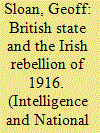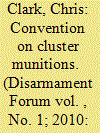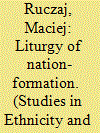| Srl | Item |
| 1 |
ID:
123176


|
|
|
|
|
| Publication |
2013.
|
| Summary/Abstract |
The teleological narrative that has dominated the handling of intelligence by the British state in the events that led up to the 1916 Irish Rebellion in Dublin has been characterised as a cocktail of incompetence and mendacity. Using new and existing archive material this article argues that both the cabinet in London and key members of the Irish Executive in Dublin were supplied with accurate and timely intelligence by the Admiralty's signals intelligence unit, the Royal Irish Constabulary and the Dublin Metropolitan Police with respect to this event. Far from being a failure of intelligence here is evidence to show that there occurred a failure of response on behalf of key decision-makers. The warnings that were given by intelligence organisations were filtered through the existing policy preferences and assumptions. As a result of these factors accurate evaluations and sound judgement were not exercised by key officials, such as Sir Matthew Nathan, in Dublin Castle.
|
|
|
|
|
|
|
|
|
|
|
|
|
|
|
|
| 2 |
ID:
097159


|
|
|
| 3 |
ID:
127031


|
|
|
|
|
| Publication |
2013.
|
| Summary/Abstract |
The Dublin 1916 Easter Rising is most often analysed in terms of the 'blood sacrifice' concept and its 'theatrical' aspect with both rhetorical devices being ascribed to Patrick (Padraic) Pearse - poet, dramatist, and a crucial figure in the development of the discourse of Irish nationalism. This article proposes a reading of Pearse's literary and political texts centred on the relation between the religious and the political. Starting with the delineation of the complex 'translation of the sacred' from the religious to the secular context, the article then examines the two above-mentioned key dimensions of the Rising, its sacrificial and 'theatrical' aspects, demonstrating their theological affinities. The two are interconnected through the thomistic theory of the liturgical sign, suggesting that the Easter Rising, as a crucial event in the construction of Irish nationhood, was devised and carried out per analogiam to the liturgical symbolism of the Catholic Mass.
|
|
|
|
|
|
|
|
|
|
|
|
|
|
|
|